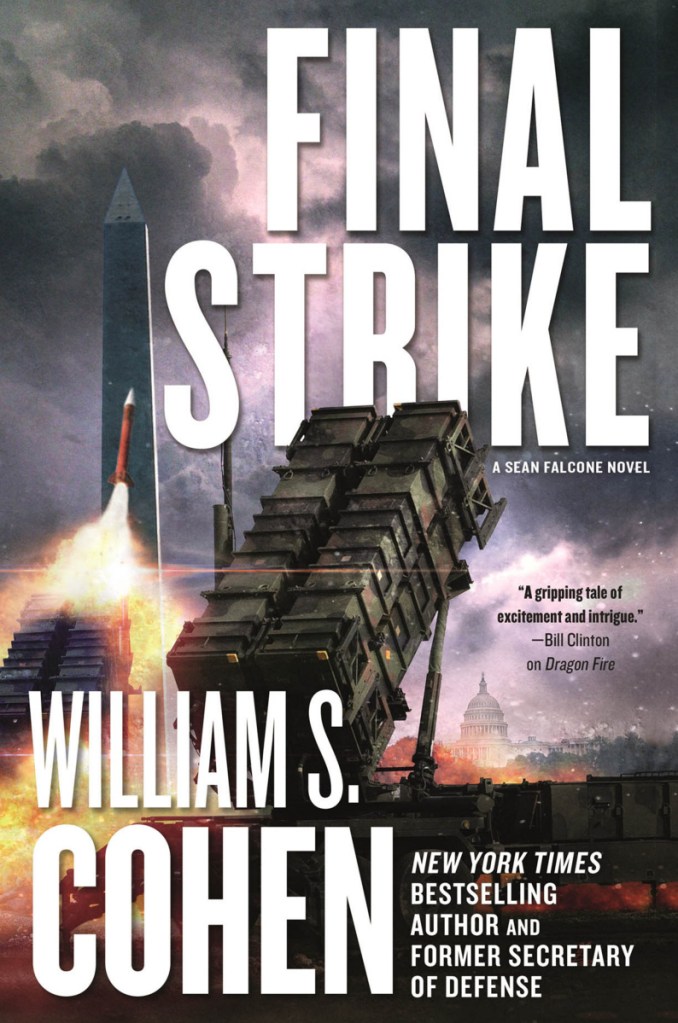In his acknowledgments, novelist William Cohen describes his latest book as a “warning (wrapped in a ‘rendition operation,’ some of which I drew from my experience at the Pentagon) and to show how technology can help save us from catastrophe as well as take us there.” Cohen is a former Maine senator who also served as President Bill Clinton’s secretary of defense, and the threatened catastrophe in his book is the approach of an asteroid even bigger than the one that snuffed out the dinosaurs.
Science fiction has always tended to carry at least a subliminal admonition about the consequences of humanity’s failings. As those consequences become more specifically defined – for example, terrorism, overpopulation and, above all, climate change – the warnings have spread to the mystery/thriller genre, creating a whole new sub-genre.
The problem is that blending fiction with complicated science requires the author to give detailed explanations, which become a drag on the momentum that makes a page-turner thrilling. The need to educate the reader inevitably feels self-conscious, as well.
And so it is with “Final Strike,” the third Cohen novel featuring once and future National Security Adviser Sean Falcone. At 460 pages, it actually seems like three related stories jammed together. Cohen is at his best in the middle section, where his familiarity with government institutions allows the action to develop in a manner that does not stretch our credulity too far, and at the same time gives some dimension to the protagonists. But these chapters are sandwiched between more contrived and less believable ones describing the actual “rendition” – as in CIA kidnapping – and the eventual fate of the asteroid.
The first section of the story is a fairly straightforward and not terribly original spy thriller. The Cold War meme of Russians – untrustworthy at best, more often actually evil – is back in fashion, and there is the de rigueur smattering of high-end product names (Regalia vodka, Gulfstream G550s galore). Characters are defined by their material idiosyncrasies (“his usual 10 laps in the hotel pool,” “his usual breakfast – pineapple juice, eggs Benedict, black coffee”). A spritz of the insider’s Washington (“I hear the Metropolitan Club’s crab cakes are divine”) seems designed to give the whole a contemporary immediacy.
Despite the clunky dialogue, some of the plot’s intricacies are ingenious, although the actual rendition (escape from a shut-down Moscow with a drugged fundamentalist American billionaire) is oddly anti-climactic.
With the asteroid getting nearer and nearer, the last section becomes a race against time to destroy it before it destroys the Earth.
A lot of (presumably accurate) technological back-and-forth alternates with the grim realities of a world population under imminent sentence of death. Ronald Reagan famously told Russian General Secretary Mikhail Gorbachev that in the face of an attack on the world from outer space, “we’d forget all the little differences we have between our countries.” But not, in Cohen’s view, between our political parties. Faced with Armageddon, the opposition leaders obstruct and scream that it is a PR stunt by President Blake Oxley.
Elsewhere in America, riots and shootings rage across the TV screens, while in Russia and China, the authorities have clamped down so that there is nary a squeak.
“Final Strike” has a peripheral love interest, and the author rather sweetly identifies his wife as his inspiration for its female half – a killer (in both senses) Mossad spy. There are plenty of other doppelgängers. Putin has been discreetly murdered and succeeded by Boris Lebed, who might as well be Vladimir’s clone. An African-American scientist from a science museum, known for his popular TV science shows, sounds rather like Neil deGrasse Tyson. (With the White House in crisis mode, the president still has time to introduce the scientist to his son and get his autograph.) The president himself, initials B.O., is also half African-American and very cool.
These thin attempts to fictionalize reality are never so transparent and amusing as is – among an ocean of real acronyms – GNN, the 24-hour cable news network whose studio imaging of the fiery asteroid and breathless news coverage can hardly hide behind that innocent-looking G.
William Cohen is known to have a mystical side, and it is on display in the form of rather weird freestyle verses that precede, without explanation, different parts of the book. They appear to be the mind of the asteroid itself and end, “I am a force you cannot stop/and for your sin you’ll join me soon/in oblivion.”
In a final soliloquy, his alter ego, Sean Falcone, recalls Pandora’s Box, from which the Greeks believed all the ills of the world were unleashed when she opened it. Only one thing was left inside: Hope. By the end of “Final Strike,” Cohen doesn’t leave the reader much of that either.
Thomas Urquhart is a former director of Maine Audubon and the author of “For the Beauty of the Earth.”
Copy the Story LinkSend questions/comments to the editors.



Success. Please wait for the page to reload. If the page does not reload within 5 seconds, please refresh the page.
Enter your email and password to access comments.
Hi, to comment on stories you must . This profile is in addition to your subscription and website login.
Already have a commenting profile? .
Invalid username/password.
Please check your email to confirm and complete your registration.
Only subscribers are eligible to post comments. Please subscribe or login first for digital access. Here’s why.
Use the form below to reset your password. When you've submitted your account email, we will send an email with a reset code.